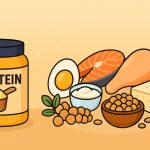Nuts are among the most nutrient-dense and convenient foods you can eat. Packed with healthy fats, protein, vitamins, and antioxidants, nuts support heart health, brain function, and weight management. But not all nuts are created equal—some types offer unique benefits that make them especially valuable depending on your health goals.
Why Nuts Are So Healthy
Nuts are energy-rich foods that contain:
- Unsaturated fats that support heart and brain health
- Protein to help with muscle repair and satiety
- Fiber for healthy digestion
- Magnesium, vitamin E, and antioxidants that reduce inflammation and cellular damage
Despite being calorie-dense, nuts have been linked to reduced risk of heart disease, type 2 diabetes, and even improved lifespan when consumed regularly in moderation.
The Best Types of Nuts and Their Benefits
Here’s a breakdown of some of the healthiest nuts and what makes each one special:
Almonds
Rich in vitamin E, calcium, and antioxidants, almonds are great for skin health and bone support. They also help lower bad cholesterol (LDL) and regulate blood sugar.
Walnuts
Walnuts are high in omega-3 fatty acids, which benefit brain function and reduce inflammation. They are one of the best nuts for heart health.
Cashews
Cashews are creamy and rich in magnesium, zinc, and iron. They support immune function and are often used in vegan recipes as a dairy substitute.
Pistachios
These green-hued nuts are high in protein and low in calories compared to other nuts. They also contain lutein, which supports eye health.
Brazil Nuts
Just one Brazil nut contains more than 100% of the selenium you need daily. Selenium is important for thyroid function and immunity—but these nuts should be eaten in small amounts to avoid toxicity.
Hazelnuts
Hazelnuts support heart health and are rich in folate, which is important during pregnancy and for brain development.
Pecans
Pecans are full of antioxidants and healthy fats, making them ideal for protecting cells from damage and reducing oxidative stress.
How to Eat Nuts the Healthy Way
To maximize benefits:
- Choose unsalted, dry-roasted, or raw varieties
- Avoid heavily processed or sugar-coated nuts
- Eat a handful (about 30g) per day as a snack or salad topper
- Store nuts in airtight containers to prevent rancidity
They pair well with fruits, yogurt, oats, or can be blended into nut butters and plant-based sauces.
Glossary
- Unsaturated fats – Heart-healthy fats that help lower cholesterol and inflammation.
- Antioxidants – Molecules that protect the body from free radical damage.
- Omega-3 fatty acids – Essential fats that reduce inflammation and support brain and heart health.
- Selenium – A trace mineral important for thyroid health and immunity.
- LDL cholesterol – Also known as “bad” cholesterol; high levels can lead to heart disease.


